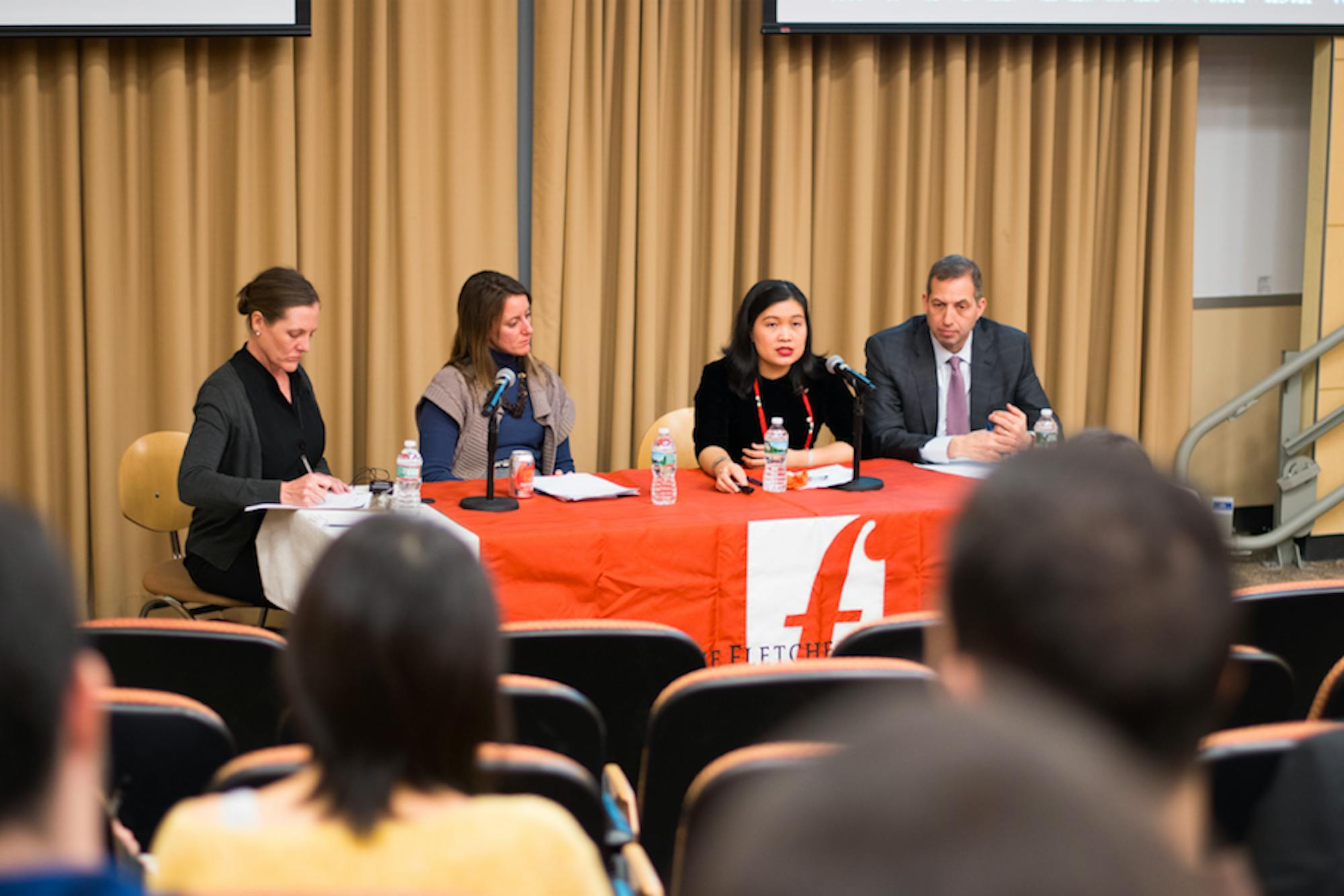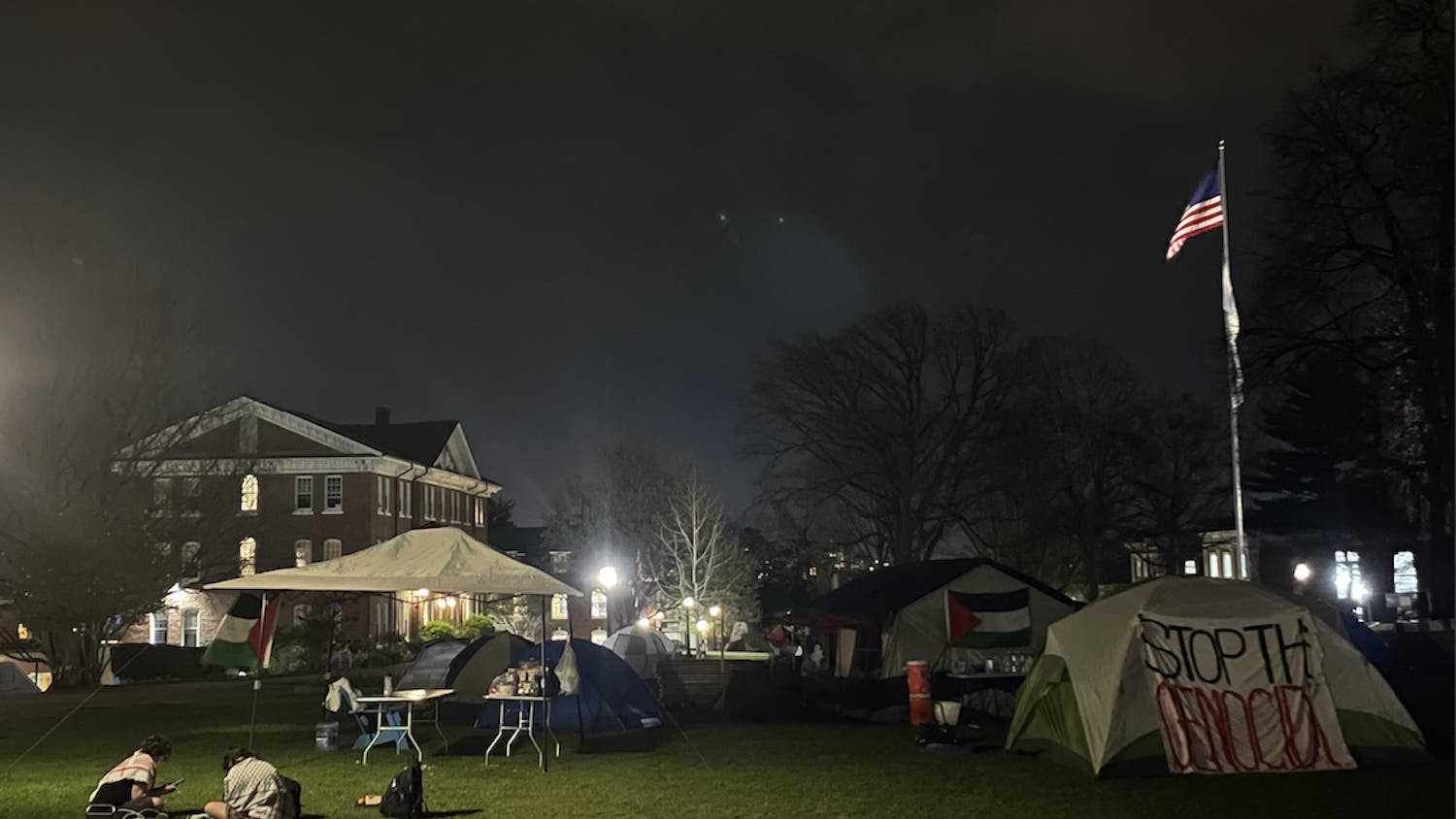Panelists spoke about Myanmar's Rohingya crisis, covering historical religious tensions and ethnic discrimination, during a panel last night entitled "Myanmar in Crisis: What Happens Next?". The event, held in the ASEAN Auditorium at The Fletcher School of Law and Diplomacy, was hosted by the Fletcher Initiative on Religion, Law & Diplomacy (RLD) and co-hosted by the Fletcher Islamic Society, the Fletcher Humanitarian Action Society and the Fletcher Diplomacy Club.
Kathleen Hamill, an adjunct professor at The Fletcher School and a practicing human rights lawyer, moderated the panel. The speakers were May Sabe Phyu, director of the Gender Equality Network and human rights activist, Ambassador Derek Mitchell (F ’91), former U.S. ambassador to Myanmar and senior advisor to the Asia Program at the United States Institute of Peace (USIP) and Reverend Susan Hayward (F ’06), Senior Advisor for religion and inclusive societies at USIP. The event was co-sponsored by The Henry R. Luce Foundation and World Peace Foundation. Close to fifty people were in attendance, including Tufts faculty, Fletcher students, undergraduate students and May Sabe Phyu’s family.
The panel focused on the importance of religious literacy, defined as “the ability to discern and analyze the fundamental intersections of religion, politics and cultural life through multiple lenses.” According to the Fletcher website, the panel is part of a speaker series hosted by the RLD this spring that emphasizes the universal importance of religious literacy.
Hamill opened the discussion by establishing the gravity of Myanmar’s current Rohingya crisis.
“We are here today to talk about the country of Myanmar in crisis and to examine the question: What happens next?" she said. "Since August of 2017, over half a million Rohingya have fled their homes. Myanmar has been [plagued] by internal strife and ethnic tensions for decades with extreme and disproportionate use of military force in the Rakhine state.”
The speakers then explained that the Rohingya crisis is rooted in deep historical and ethnic tensions, worsened by their geopolitical placement between India and China and emboldened by strong Buddhist nationalism.
May Sabe Phyu explained that the politicization of religion exacerbates tension in Myanmar and highlighted three key aspects of the crisis.
“I would like to reiterate [the] three key things that are happening right now. The first is belonging. People are displaced from where they belong ... The second is equality and fair treatment," she said. "And third, the most distressing, recurring thing is the attacks against ethnic minorities ... These are three things you have to consider to understand Myanmar.”
Mitchell further elaborated that it is important to not simplify or generalize the crisis in Myanmar.
"What I learned very early on is … there was a vision for unified national identity, where there is justice for everyone equally," he said. "But unfortunately there clearly hasn’t been [a] working out of this problem of social trust and identity.”
Finally, the speakers reflected on steps toward equality and justice. Hayward observed that citizens have started to move away from the cycles of conflict and discrimination.
“The issue needs to be more about these communities advocating for the state implementing laws that can help promote religious harmony," she argued.
The event ended with a question-and-answer session.
CORRECTION: This article has been updated to clarify the hosts and co-hosts of the event and the larger speaker series of which it is a part.
Panelists address religious literacy, ethnic discrimination in discussion on Rohingya crisis

Professor Kathleen Hamill (F99), Reverend Susan Hayward (F06), May Sabe Phyu, and Derek Mitchell (F91) give a panel speech about the Rohingya Crisis in Myanmar in front of an audience of Tufts students and faculty in ASEAN Auditorium on Feb. 12, 2018 (Mike Feng / The Tufts Daily)





